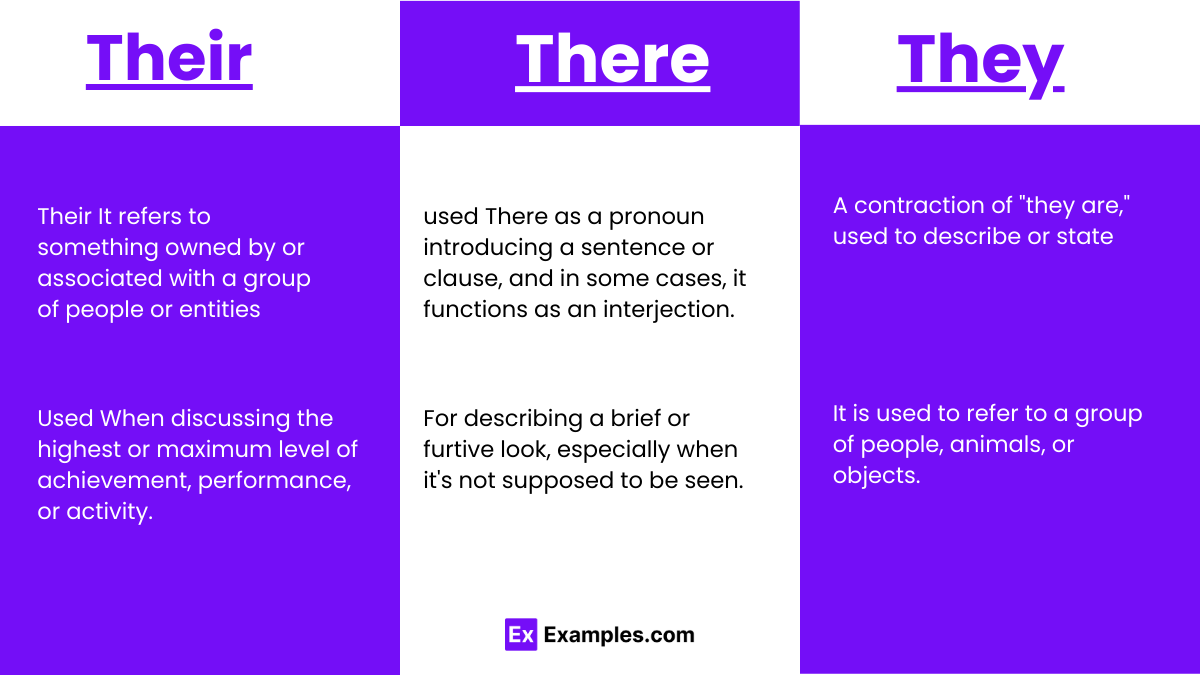Their vs There vs They’re – Examples, Difference, Usage, How to use, Tips
In English, “their,” “there,” and “they’re” are often sources of confusion due to their identical pronunciation but distinct meanings and uses. These words are classic examples of homophones—words that sound the same but have different meanings and spellings. Mastering their proper usage is crucial for clear and effective communication.
- Their Meaning: “Their” is a possessive pronoun used to indicate ownership or belonging to them. It refers to something owned by or associated with a group of people or entities previously mentioned or easily identified.
- There Meaning: “There” is an adverb that denotes a location or place. It can also be used as a pronoun introducing a sentence or clause, and in some cases, it functions as an interjection.
- They’re Meaning: “They’re” is a contraction of “they are.” It is used to refer to a group of people, animals, or objects. The apostrophe indicates the omission of the letter “a” from “are.”
Summary
Understanding the differences between “their,” “there,” and “they’re” is essential for crafting sentences that accurately convey intended meanings. “Their” signifies possession, pointing to something that belongs to a group. “There” identifies a location, serving as a linguistic tool to point out where something is situated, or to introduce subjects or concepts. “They’re,” a contraction, simplifies the expression of “they are,” linking it directly to the subject being discussed. These three words, while sounding identical, perform unique roles within the English language, highlighting the importance of context and grammatical structure in determining their appropriate use. Mastery of “their,” “there,” and “they’re” not only enhances written and spoken communication but also underscores the nuances of English grammar, enabling more precise and engaging exchanges.
How to pronounce Their vs There vs They’re
- Their, There, They’re: All three are pronounced the same way: /ðɛər/
- User: Is pronounced /ˈjuːzər/
Differences between Their, There, They’re
| Word | Part of Speech | Meaning | Example |
|---|---|---|---|
| Their | Possessive Pronoun | Indicates something owned or associated with a group of people. | Their house is at the end of the street. |
| There | Adverb/ Pronoun | Refers to a place or position, or introduces a subject or clause. | There is a book on the table. |
| They’re | Contraction | Contraction of “they are,” referring to a group of people, animals, or things. | They’re going to the concert tonight. |
How to Use Their, There, They’re
Examples Their vs There vs They’re
Their
Their dog always barks at night.”
“I admire their dedication to the cause.”
“The team wore their new uniforms for the game.”
“All students must submit their assignments by Friday.”
“Their vacation photos are absolutely stunning.”
There
“Look over there; you can see the mountains.”
“There are four apples in the basket.”
“I hope to move to New York; there is so much to do.”
“There seems to be a misunderstanding.”
“There was a loud noise coming from the attic.”
They’re
“They’re planning to remodel their kitchen next month.”
“I can’t believe they’re still awake at this hour.”
“They’re all good friends from college.”
“They’re expected to arrive by 3 PM.”
“Look how fast they’re running.
Synonyms for Their, There, They’re
| Word | Synonyms |
|---|---|
| Their | Possessive (as in “one’s”), belonging to them |
| There | In that place, at that location, in that position |
| They’re | They are, contraction indicating a group is or does something |
Usage of Their, There, They’re
Their: Used to indicate possession or belonging to a group of people or things. It implies that something belongs to them.
- Example: “Their enthusiasm was contagious.”
There: Refers to a specific location or place, or is used to introduce a subject or clause. It can denote a place either physically or figuratively.
- Example: “There is always hope.”
They’re: A contraction of “they are,” used to describe or state something about a group of people, animals, or objects.
- Example: “They’re always punctual.
Exercise
Their vs. There vs. They’re: Fill in the Blanks Questions
- ________ going to the park this afternoon.
- Is ________ any milk left in the fridge?
- ________ new teacher is quite experienced.
- I hope ________ will be cake at the party.
- ________ always talking about moving abroad.
- The keys are over ________; on the kitchen counter.
- ________ efforts paid off when they won the competition.
- Look at the clouds; ________ looks like it might rain.
- ________ planning to adopt a puppy from the shelter.
- ________ project received the highest marks in class.
Answers
- They’re
- There
- Their
- there
- They’re
- there
- Their
- it (This doesn’t directly fit “their,” “there,” or “they’re” but suggests “there” from the options provided.)
- They’re
- Their
FAQ’S
When should you use “there” or “their”?
Use “there” when referring to a place or location, or to introduce a subject or clause. For example: “I left my keys over there.”
Use “their” to indicate possession or ownership by people, animals, or entities. For example: “Their house is at the end of the street.”
How do you use “they’re” in a sentence?
“They’re” is a contraction of “they are.” Use it when you want to refer to a group of people, animals, or things and describe something about them. For example: “They’re planning to go to the beach this weekend.”
Can I use “they’re” for things?
Yes, you can use “they’re” for things, as long as you’re referring to a group or collection of inanimate objects and attributing some characteristic or action to them. For example: “The cookies are on the counter. They’re freshly baked.”




